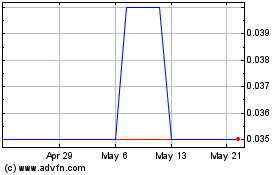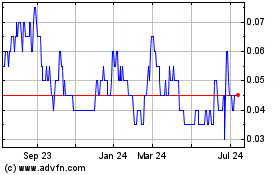MacDonald Announces Fall Drill Program & Results from Spring Exploration
07 August 2013 - 10:00PM
Marketwired Canada
MacDonald Mines Exploration (TSX VENTURE:BMK) ("MacDonald" or "the Company") has
received the results from its Spring 2013 drill program targeting volcanogenic
massive sulfides ("VMS") in the Ring of Fire ("ROF"). Two drill targets were
tested during the program over the Butler 3 and Butler 4 targets respectively.
The Butler 3 drilling did not hit appreciable copper or zinc mineralization, but
did intersect hydrothermally altered felsic and intermediate volcanic rocks that
are indicative that the drill holes are proximal to a large VMS body. The Butler
4 drilling intersected copper and zinc mineralization that Company geoscientists
believe to be associated with stratabound mineralization that extends to depth.
"MacDonald is keenly aware that the market, especially today, is only motivated
by huge success. James Bay exploration is tough, it is a wetland with little
outcrop. Consequently we must utilize drill results for ongoing quantification
that further exploration is warranted. The Butler 3 and Butler 4 targets have
all the necessary components for discovery:
-- A large heat source (ultramafics, proven komatiates)
-- Laterally extensive alteration (a large system)
-- Known mineralization; zinc, copper, silver and lead
-- Secondary mineralization typically associated with larger VMS systems -
tin, enrichment of P2O5 "icelandite"
-- Geophysical signatures (EM, IP, magnetics, and gravity)
We believe we are now moving to the final stages of our exploration efforts. We
have quantified geochemical, geophysical and geological (structural) targets and
are working on prioritizing these for the next stage of exploration. We expect
to be drilling in the fall of 2013 after a full compilation of the data." - Kirk
McKinnon, President & CEO
Two drill holes (BP13-CU19 and CU20), were drilled on the Butler 3
geochemical/geophysical anomaly. No appreciable copper or zinc mineralization
was intersected within these drill holes, however the lithologies intersected
sodium depleted intermediate and felsic volcanic rocks. This geochemical
signature represents a classic alteration vector for VMS mineralization, and
leads Company geoscientists to the conclusion that VMS mineralization is to the
south-west.
The targeting of the south-west likely represents the extension of the
mineralized zone intersecting in drill hole BP12-Cu14. It appears that BP12-Cu19
and BP12-Cu20 are lateral to the mineralized zone.
-- Hole BP12-Cu14 intersected 41.5m of 0.4% Cu, 3.26% Zn and 6g/t Ag
-- Including:
-- 12.5m of 8.54% Zn and 6.24 g/t Ag
-- 5.0m of 1.18% Cu, 3.86% Zn and 14.48 g/t Ag
The target area to the south-west is corroborated by a coincident EM and IP
anomaly. Before drilling this target however, the Company intends to conduct a
robust structural analysis of the existing drill holes under the direction of
Rogerio Noal Monteiro, Ph. D. (Vektore Exploration and Consulting). This data
will be used in conjunction with the geochemical and geophysical vector analysis
to guide drill targeting.
Drill holes BP13-CU21 and CU22 were drilled on the Butler 4 geophysical anomaly
(with coincident IP and EM geophysical anomalies). BP13-CU22 intersected 7.50%
zinc over a 3 metre interval, and 0.23% copper over 2 metres. Drill hole
BP13-CU21 intersected 0.15% copper over a 12 metre interval. These drill
intersections are significant in that they pierced the upper edge of a large
sub-vertical electromagnetic plate that was postulated to be associated with VMS
mineralization. Now that the Company has verified that this geophysical target
is associated with copper and zinc mineralization, a detailed analysis of the
structural geology will be undertaken on the target. This information, in
conjunction with geochemical and geophysical analysis will be used to develop
discrete drill targets.
On-site Quality Assurance/Quality Control Measures
All samples have been shipped to ACTLABS preparation laboratory in Thunder Bay
Ontario. Analyses will be performed in the ACTLABS laboratory in Ancaster or
Thunder Bay, Ontario. All core samples were selected by the MacDonald Mines site
geologist, and were cut in half by diamond core saw. Individual samples were
labelled, placed in plastic sample bags and sealed. Groups of samples were then
placed into durable rice bags that shipped out on an ongoing basis. The
remaining coarse reject portions of the samples remain in storage at the ACTLABS
preparation laboratory storage facility in Thunder Bay as required in the event
that further work is needed.
Independent Quality Assurance and Quality Control Protocol
A QA/QC program has been implemented to monitor all assays from the current
drilling program. Samples are assembled batches and are continuously leaving the
site for immediate testing. Included in each batch of samples are certified
reference standards every 20 samples and blank samples comprised of sterile
drill core placed in at random locations (approximately every 20-30 samples).
Qualified Person
Quentin Yarie, P.Geo., is the qualified person in regard to the technical data
contained within this news release and will be responsible for overseeing all
aspects of the Company's exploration programs.
About MacDonald Mines Exploration Ltd.
MacDonald Mines has steadily moved its exploration forward for 10 years in James
Bay's Ring of Fire. The company, under the direction of Hadyn Butler, P.Geo,
located and staked what has proven to be highly prospective ground for potential
discovery.
This area of James Bay presents a unique opportunity in that the Ring of Fire
contains the entire suite of minerals including VMS, nickel, chrome, vanadium,
titanium and gold potential. The only other similar region is in the Bushveld in
South Africa but this region lacks the copper, zinc and nickel content of James
Bay.
MacDonald's exploration team is led by Quentin Yarie, P.Geo and Craig Scherba,
P.Geo and supported by key renowned consultants in their respective fields. They
include, Jim Franklin, PhD, P.Geo, for VMS, and Larry Hulbert, PhD, P.Geo, for
nickel, chrome and vanadium.
Cautionary Statement: Neither TSX Venture Exchange nor its Regulation Services
Provider (as that term is defined in the policies of the TSX Venture Exchange)
accepts responsibility for the adequacy or accuracy of this release. No stock
exchange, securities commission or other regulatory authority has approved or
disapproved the information contained herein. The foregoing information may
contain forward-looking statements relating to the future performance of
MacDonald Mines Exploration Inc. Forward-looking statements, specifically those
concerning future performance, are subject to certain risks and uncertainties,
and actual results may differ materially from MacDonald Mines plans and
expectations. These plans, expectations, risks and uncertainties are detailed
herein and from time to time in the filings made by MacDonald Mines with the TSX
Venture Exchange and securities regulators. MacDonald Mines does not assume any
obligation to update or revise its forward-looking statements, whether as a
result of new information, future events or otherwise. We seek safe harbour.
FOR FURTHER INFORMATION PLEASE CONTACT:
MacDonald Mines Exploration Ltd.
Brent Nykoliation
Senior Vice President, Corporate Development
(416) 364-4986
(416) 364-2753 (FAX)
bnykoliation@macdonaldmines.com
MacDonald Mines Exploration Ltd.
Quentin Yarie, P. Geo
Senior Vice President of Exploration
(416) 364-4986
(416) 364-2753 (FAX)
qyarie@macdonaldmines.com
MacDonald Mines Explorat... (TSXV:BMK)
Historical Stock Chart
From Dec 2024 to Jan 2025

MacDonald Mines Explorat... (TSXV:BMK)
Historical Stock Chart
From Jan 2024 to Jan 2025
